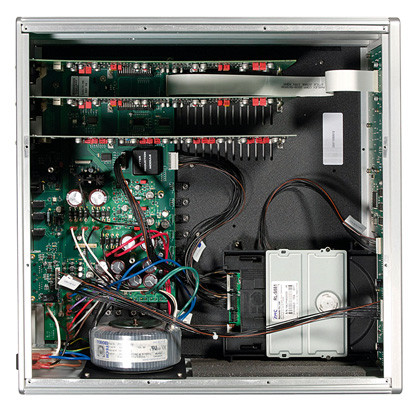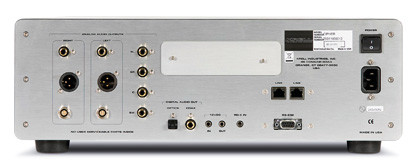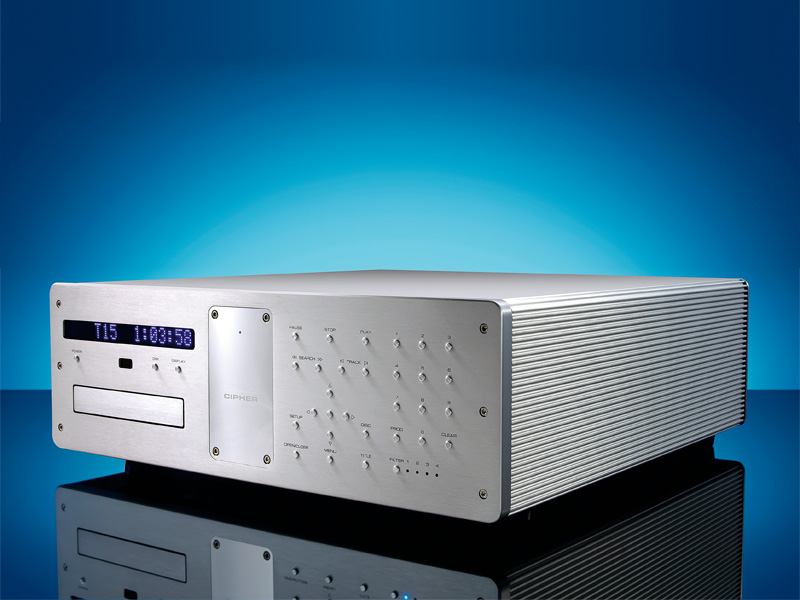TechRadar Verdict
Pros
- +
Vivid, highly detailed sound
- +
Plays DVDs (audio only)
Cons
- -
No digital input
- -
'Perfection' doesn't come cheap
Why you can trust TechRadar
The Cipher is a new high-end SACD player from Krell and is a welcome surprise. It shows there's still a market for the medium.
True, SACD software issues are somewhat limited and the format risks being superseded by high-res downloads, but many small classical and jazz labels still support SACD and issue new titles each month.
This is where the new Cipher comes in, replacing Krell's popular EV505 SACD player. It promises an improved performance – especially in terms of Red Book CD playback and while this is very welcome, it's as an SACD player that the Cipher will stand or fall.
Fortunately, Krell has spared no effort to make it as good as possible – with both formats.
Disc accuracy
The Cipher is an advanced digital disc player offering users a choice of SACD and DVD-Audio playback in two channel and multichannel surround formats. The ability to play in surround is unusual – many purist audiophile SACD players dispense with this option, offering just two channel playback.
There's a choice of three fixed-level analogue outputs: RCA (unbalanced); XLR (balanced) and – for those using Krell amplification with the appropriate inputs – a special four-pin CAST socket (CAST is claimed to offer a significant improvement in sound quality). An output for subwoofers is also included in the mix.
The Cipher's disc drive is mechanically isolated from the main chassis and the mount uses composite materials to minimise vibration-induced errors. Strategically placed damping is used to reduce mechanical resonance and Krell's customised disc-drive firmware is claimed to improve disc-reading accuracy.

SACD disc transports can be temperamental and some players gained a reputation for being mechanically noisy and unreliable. Fortunately, the transport used in the Cipher is very quiet and seems to play a wide range of discs without complaint. CDs that jump or suffer dropout on our other players, played perfectly on the Cipher.
Separate lasers for CD and SACD are employed and these are individually hand-calibrated for accuracy. All signals are fed into a custom-designed Krell anti-jitter module and this is said to reduce jitter to virtually unmeasurable levels, resulting in a perfectly clean digital signal.
D/A conversion is via a pair of balanced 24-bit/192kHz DACs. Most players use a single DAC for each channel, but Krell uses its DACs in pairs and configures them to operate in balanced mode. So, 'balanced' operation occurs throughout the signal chain – from digital through to analogue. Usefully, the Cipher can play DVD-R data discs – though not, it seems, DVD-A discs.
Prior to the launch of SACD, one or two small audiophile labels released audio-only DVDs with a sampling frequency of 48kHz. These provided better-than-CD sound quality and very long (over three hours) continuous playing time.
As an aside, EMI issued its 2005 three-CD set of Wagner's Tristan und Isolde as a special limited edition, with a bonus audio DVD containing the complete recording on a single disc lasting three hours and 47 minutes in 5.1 DTS Surround Sound. The Cipher proved able to play this disc and could even deliver the DTS information. So, if you have any music DVDs, you'll be able to listen to them via the Cipher (most SACD players can't do this).
Another slightly unusual feature is the provision of user-selectable output filters; two for CD, and four for SACD. These alter the out-of-band frequency response and output gain.
Confidence-building

The Cipher features all-aluminium casework. Being non-magnetic, aluminium is a good material to use for hi-fi casing, reducing the effects of magnetic eddy-currents. It costs more than steel, but can be relied on to deliver a smoother, more open and natural sound.
Finish is excellent, and the 'Cipher' centre panel looks very attractive. There are about thirty small press-buttons on the front panel – something that appeals to the inner geek in all of us – giving the Cipher a complex 'techy' look.
Fortunately, the button layout is logical and intuitive, so you instinctively find the right one. The buttons have a nice solid feel and operation is smooth and confidence-building.
At a cool £12,255 (including VAT) the Cipher is not cheap. Although well made and beautifully finished, we'd not say it offers 'battleship' build quality. However, excessively heavy build is not always advantageous. From the standpoint of resonance and energy storage, a light but solid case (as here) is often best.
Sound quality is likely to be the determining factor when it comes to deciding whether or not the Cipher justifies its hefty price tag. But give it a good SACD and it delivers a quality of sound that even the finest CD players cannot equal.
Smooth tonality
The Cipher's exceptionally lucid presentation is notable for amazing clarity and astonishing fine detail. Musically, the sound is open, lean, and crisp – not the least bit warm or romantic. At the same time, there's impressive refinement and (despite the sharpness) a smooth neutral tonality.
Playing SACDs on the Cipher forcibly demonstrates the limitations of conventional Red Book CD. SACD offers a transparent openness, plus a wealth of fine detail that even the best CDs can't match. There's a predictable 'sameness' about CD that SACD eliminates – the latter has a far wider range of tone colours and dynamics.
If anything, the Cipher widens the sonic gap between SACD and CD. On difficult, demanding SACDs, the extra detail and information being delivered over CD is really apparent. Yet, despite this, CD via the Cipher proves very listenable – especially when judged on its own terms and not directly compared.
We had another SACD player on standby to provide a comparison point for the Cipher and this cheaper player made the sonic gap between CD and SACD seem less apparent. While SACD always edged it over CD, the difference between the two is much less than it was with the Cipher.
Via the latter, we experienced levels of detail and clarity that no CD player could approach. The Cipher's ability to separate-out individual voices and instruments is almost uncanny, making CD sound 'closed-in', bland, and predictable by comparison. Impressive stuff!
Stereophonically, the Cipher images exceptionally well, creating a broad precisely defined soundstage notable for the solidity of individual voices and instruments. On the right SACD, you get a holographic, almost 3D effect, with impressive width and depth. SACDs sound cleaner, too.
Playing CD, the Cipher minimises that slightly 'furry' coarseness you tend to get on massed violins or heavy brass, delivering a very clean end result. But SACD sounds noticeably fresher and more alive, with crisper transients and a wider range of dynamic contrasts. The top end is more open-sounding, without a trace of tonal hardness. In comparison, CD sounds a shade muted and not nearly as transparent.
Despite these limitations, the Cipher makes a pretty good fist of playing CDs, so that – while never quite as good as SACD – you're still able to listen with pleasure and enjoy the music.
Well-heeled audiophiles
Krell's new Cipher is an exceptional digital front-end, giving state-of-theart replay of conventional CD and SACD formats. It's via SACD that it really shows its mettle, delivering results that combine stunning clarity with amazing dynamics, plus impressive naturalness and refinement.
It would be equally at home in a purist twin channel system, or a multichannel surround set up. While only the most well-heeled audiophiles will be able to consider purchasing, the Cipher certainly delivers the goods and offers results that will be hard to better, regardless of price.
Follow TechRadar Reviews on Twitter: http://twitter.com/techradarreview
